Contemporary Issues in Accounting: Global Standards and Challenges
VerifiedAdded on 2021/05/31
|13
|3293
|174
Report
AI Summary
This report delves into the contemporary issues in accounting, primarily focusing on the efforts to establish a single set of global accounting standards. It examines the roles of various standard-setting boards, including the AASB, IASB, FASB, and GAAP, in promoting harmonization and standardization of financial reporting. The report explores the objectives of these bodies, the processes they employ, and the benefits of a unified standard, such as increased transparency, economic efficiency, and comparability for multinational companies. It also addresses the challenges and issues associated with achieving global standardization, including difficulties in accommodating diverse economic environments, interpretation complexities, and the potential neglect of developing countries' interests. The report further analyzes the institutional theory's relevance to accounting standardization and discusses the feasibility of achieving a single global standard, concluding with a critical assessment of the IASB's goals and the obstacles it faces.
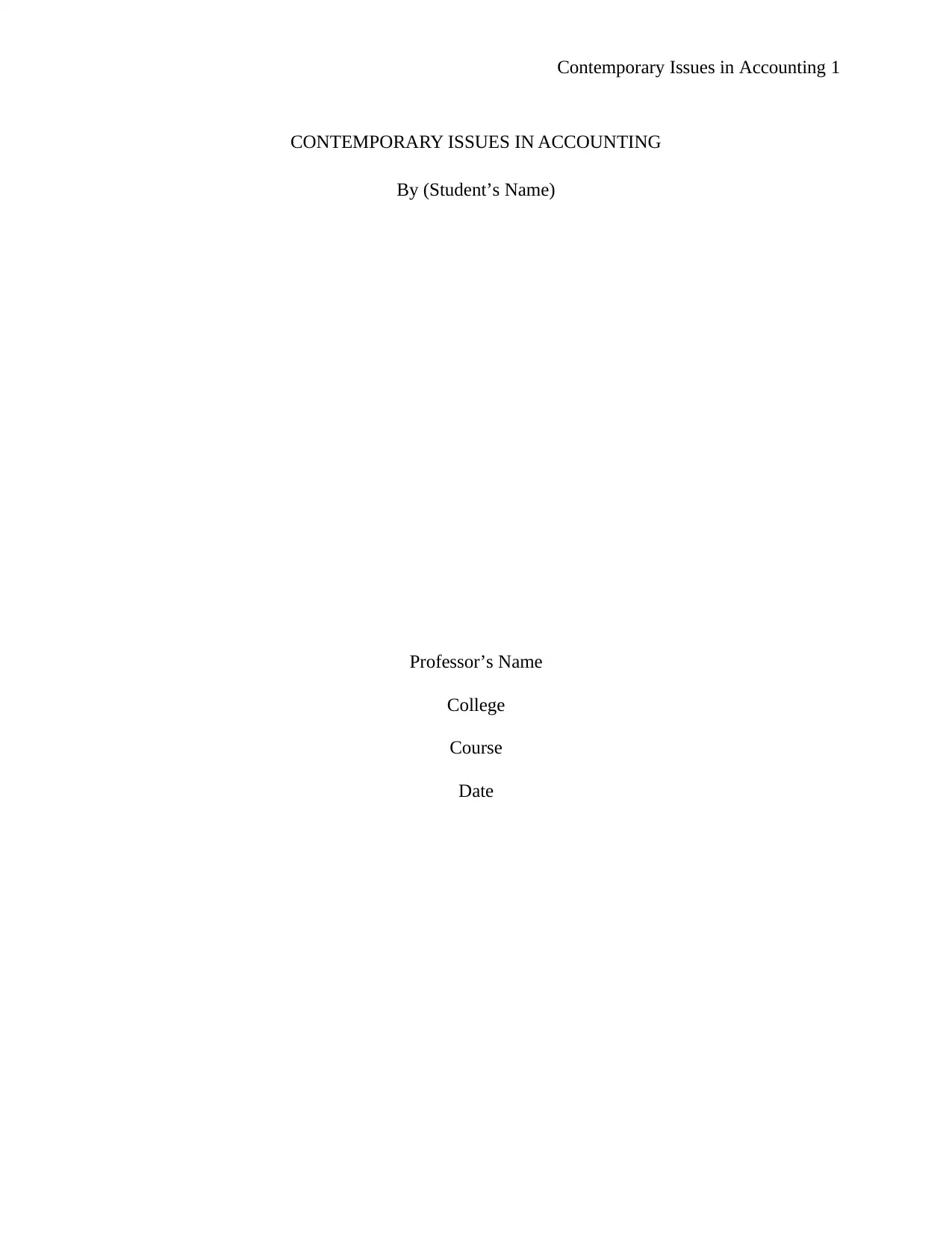
Contemporary Issues in Accounting 1
CONTEMPORARY ISSUES IN ACCOUNTING
By (Student’s Name)
Professor’s Name
College
Course
Date
CONTEMPORARY ISSUES IN ACCOUNTING
By (Student’s Name)
Professor’s Name
College
Course
Date
Paraphrase This Document
Need a fresh take? Get an instant paraphrase of this document with our AI Paraphraser
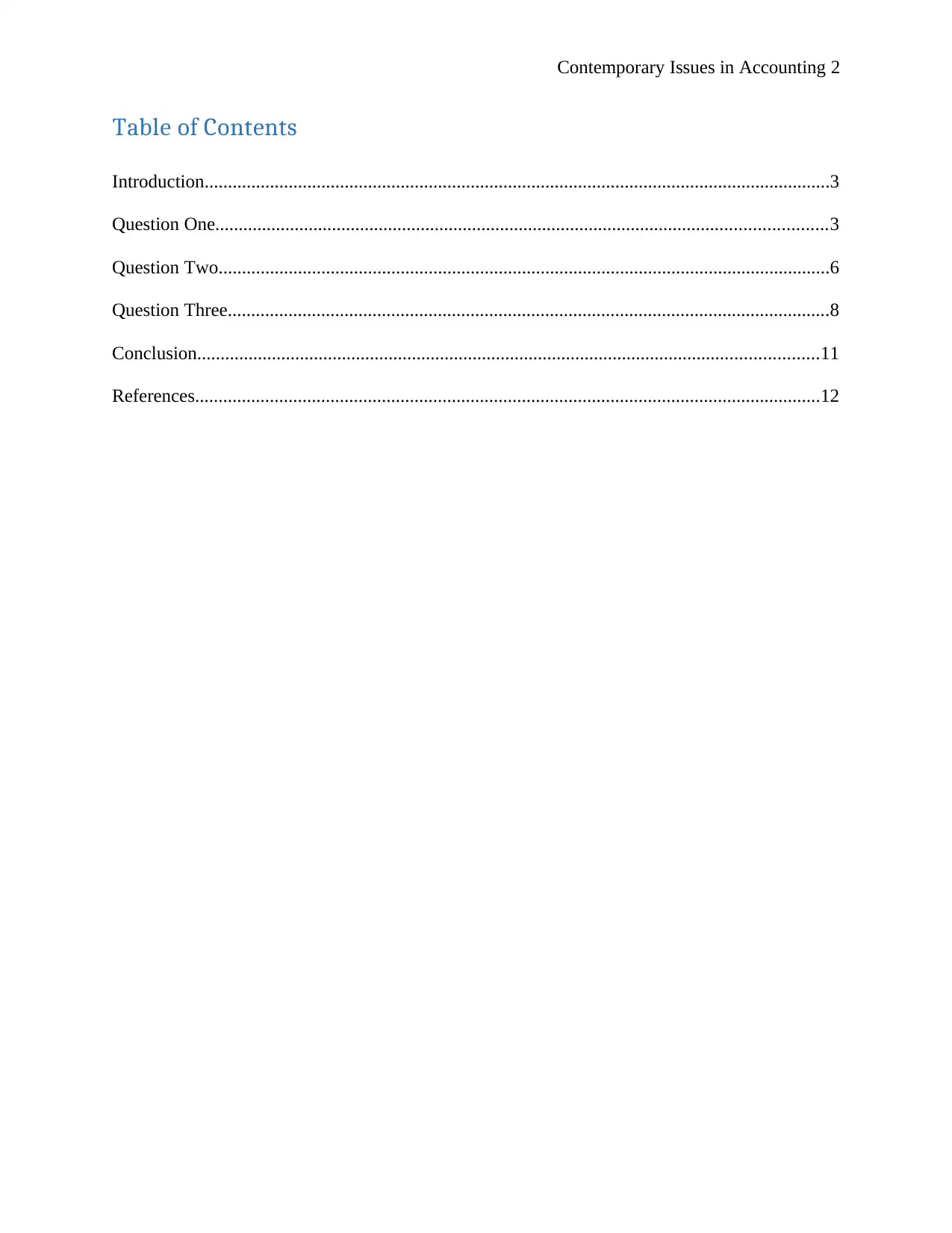
Contemporary Issues in Accounting 2
Table of Contents
Introduction......................................................................................................................................3
Question One...................................................................................................................................3
Question Two...................................................................................................................................6
Question Three.................................................................................................................................8
Conclusion.....................................................................................................................................11
References......................................................................................................................................12
Table of Contents
Introduction......................................................................................................................................3
Question One...................................................................................................................................3
Question Two...................................................................................................................................6
Question Three.................................................................................................................................8
Conclusion.....................................................................................................................................11
References......................................................................................................................................12
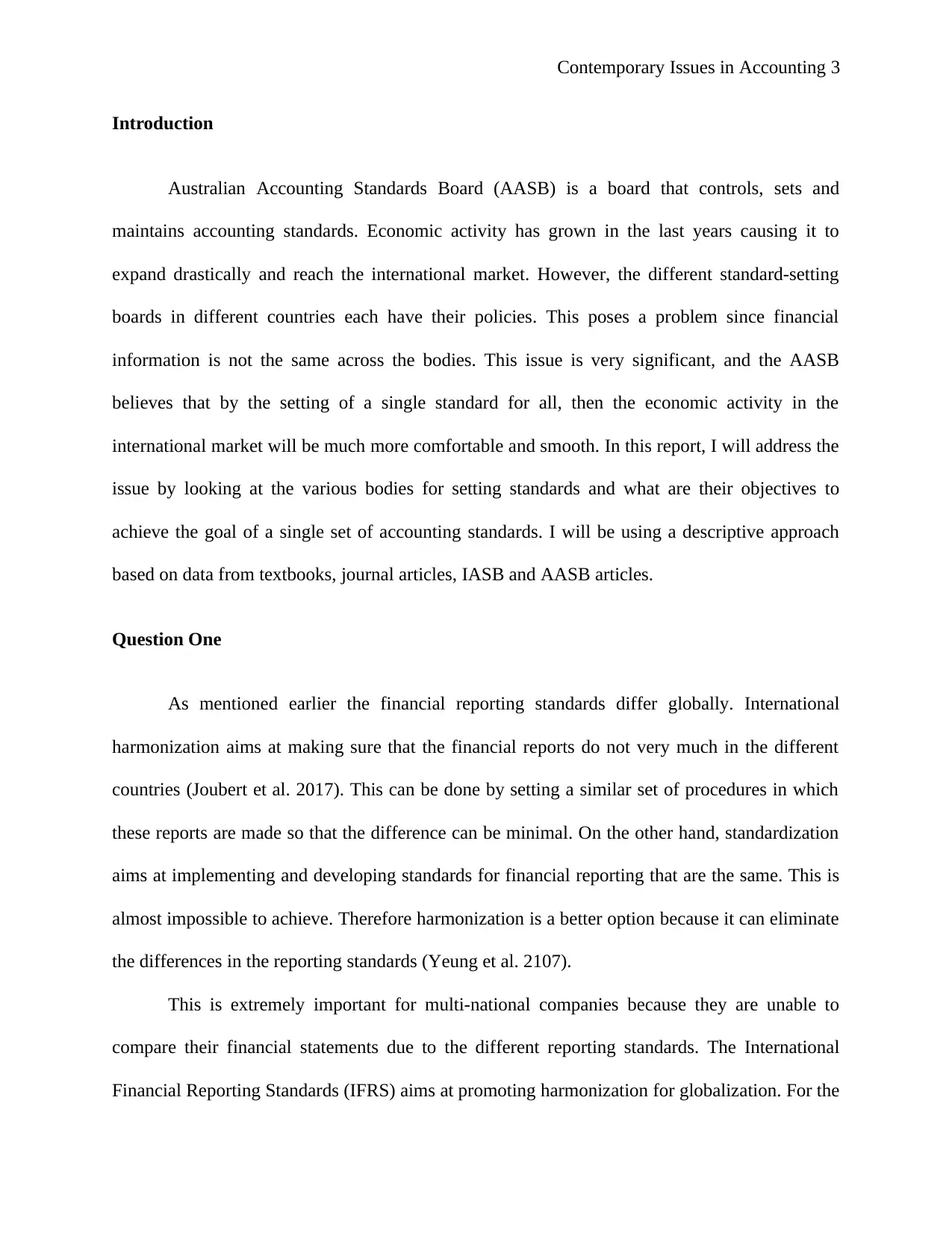
Contemporary Issues in Accounting 3
Introduction
Australian Accounting Standards Board (AASB) is a board that controls, sets and
maintains accounting standards. Economic activity has grown in the last years causing it to
expand drastically and reach the international market. However, the different standard-setting
boards in different countries each have their policies. This poses a problem since financial
information is not the same across the bodies. This issue is very significant, and the AASB
believes that by the setting of a single standard for all, then the economic activity in the
international market will be much more comfortable and smooth. In this report, I will address the
issue by looking at the various bodies for setting standards and what are their objectives to
achieve the goal of a single set of accounting standards. I will be using a descriptive approach
based on data from textbooks, journal articles, IASB and AASB articles.
Question One
As mentioned earlier the financial reporting standards differ globally. International
harmonization aims at making sure that the financial reports do not very much in the different
countries (Joubert et al. 2017). This can be done by setting a similar set of procedures in which
these reports are made so that the difference can be minimal. On the other hand, standardization
aims at implementing and developing standards for financial reporting that are the same. This is
almost impossible to achieve. Therefore harmonization is a better option because it can eliminate
the differences in the reporting standards (Yeung et al. 2107).
This is extremely important for multi-national companies because they are unable to
compare their financial statements due to the different reporting standards. The International
Financial Reporting Standards (IFRS) aims at promoting harmonization for globalization. For the
Introduction
Australian Accounting Standards Board (AASB) is a board that controls, sets and
maintains accounting standards. Economic activity has grown in the last years causing it to
expand drastically and reach the international market. However, the different standard-setting
boards in different countries each have their policies. This poses a problem since financial
information is not the same across the bodies. This issue is very significant, and the AASB
believes that by the setting of a single standard for all, then the economic activity in the
international market will be much more comfortable and smooth. In this report, I will address the
issue by looking at the various bodies for setting standards and what are their objectives to
achieve the goal of a single set of accounting standards. I will be using a descriptive approach
based on data from textbooks, journal articles, IASB and AASB articles.
Question One
As mentioned earlier the financial reporting standards differ globally. International
harmonization aims at making sure that the financial reports do not very much in the different
countries (Joubert et al. 2017). This can be done by setting a similar set of procedures in which
these reports are made so that the difference can be minimal. On the other hand, standardization
aims at implementing and developing standards for financial reporting that are the same. This is
almost impossible to achieve. Therefore harmonization is a better option because it can eliminate
the differences in the reporting standards (Yeung et al. 2107).
This is extremely important for multi-national companies because they are unable to
compare their financial statements due to the different reporting standards. The International
Financial Reporting Standards (IFRS) aims at promoting harmonization for globalization. For the
⊘ This is a preview!⊘
Do you want full access?
Subscribe today to unlock all pages.

Trusted by 1+ million students worldwide
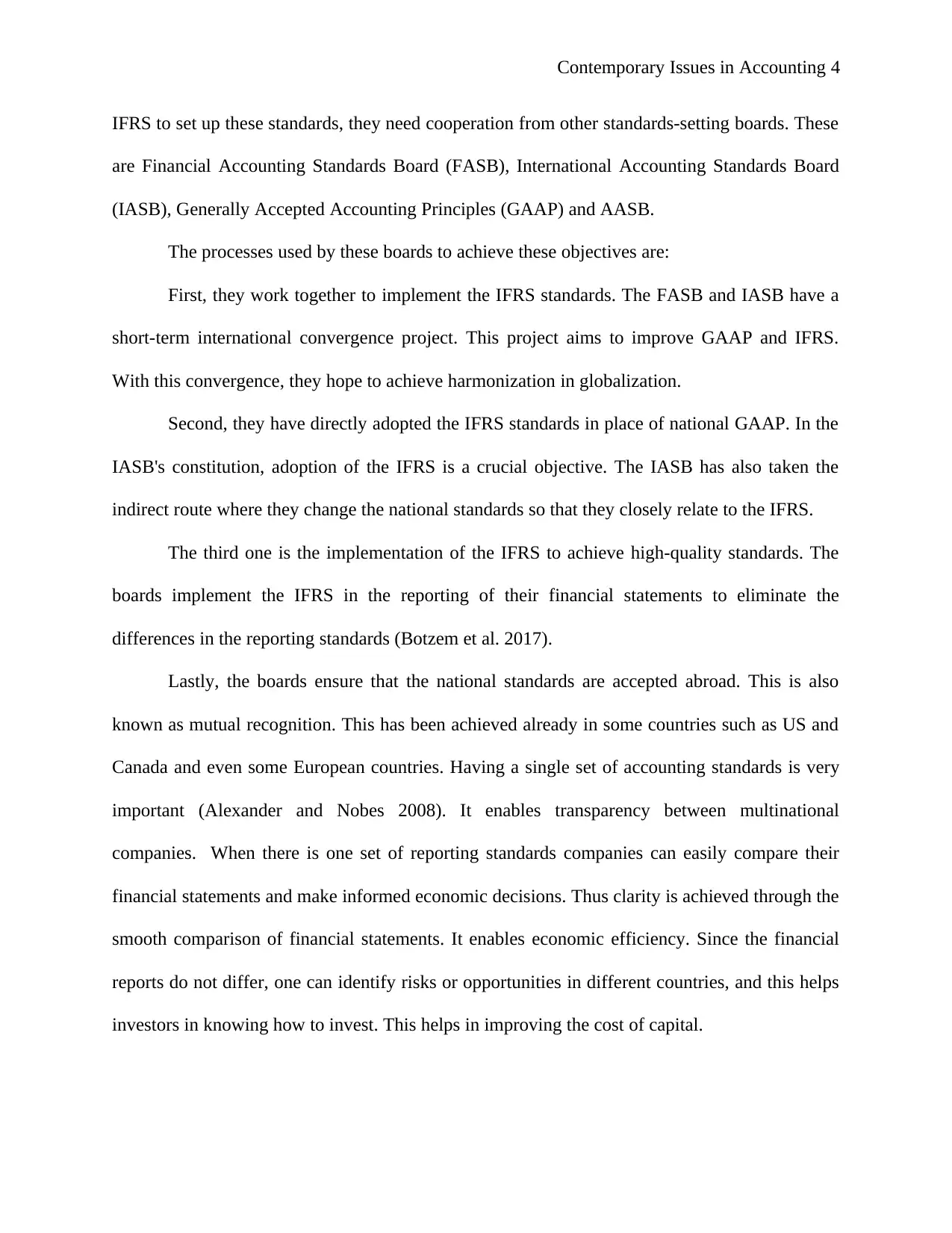
Contemporary Issues in Accounting 4
IFRS to set up these standards, they need cooperation from other standards-setting boards. These
are Financial Accounting Standards Board (FASB), International Accounting Standards Board
(IASB), Generally Accepted Accounting Principles (GAAP) and AASB.
The processes used by these boards to achieve these objectives are:
First, they work together to implement the IFRS standards. The FASB and IASB have a
short-term international convergence project. This project aims to improve GAAP and IFRS.
With this convergence, they hope to achieve harmonization in globalization.
Second, they have directly adopted the IFRS standards in place of national GAAP. In the
IASB's constitution, adoption of the IFRS is a crucial objective. The IASB has also taken the
indirect route where they change the national standards so that they closely relate to the IFRS.
The third one is the implementation of the IFRS to achieve high-quality standards. The
boards implement the IFRS in the reporting of their financial statements to eliminate the
differences in the reporting standards (Botzem et al. 2017).
Lastly, the boards ensure that the national standards are accepted abroad. This is also
known as mutual recognition. This has been achieved already in some countries such as US and
Canada and even some European countries. Having a single set of accounting standards is very
important (Alexander and Nobes 2008). It enables transparency between multinational
companies. When there is one set of reporting standards companies can easily compare their
financial statements and make informed economic decisions. Thus clarity is achieved through the
smooth comparison of financial statements. It enables economic efficiency. Since the financial
reports do not differ, one can identify risks or opportunities in different countries, and this helps
investors in knowing how to invest. This helps in improving the cost of capital.
IFRS to set up these standards, they need cooperation from other standards-setting boards. These
are Financial Accounting Standards Board (FASB), International Accounting Standards Board
(IASB), Generally Accepted Accounting Principles (GAAP) and AASB.
The processes used by these boards to achieve these objectives are:
First, they work together to implement the IFRS standards. The FASB and IASB have a
short-term international convergence project. This project aims to improve GAAP and IFRS.
With this convergence, they hope to achieve harmonization in globalization.
Second, they have directly adopted the IFRS standards in place of national GAAP. In the
IASB's constitution, adoption of the IFRS is a crucial objective. The IASB has also taken the
indirect route where they change the national standards so that they closely relate to the IFRS.
The third one is the implementation of the IFRS to achieve high-quality standards. The
boards implement the IFRS in the reporting of their financial statements to eliminate the
differences in the reporting standards (Botzem et al. 2017).
Lastly, the boards ensure that the national standards are accepted abroad. This is also
known as mutual recognition. This has been achieved already in some countries such as US and
Canada and even some European countries. Having a single set of accounting standards is very
important (Alexander and Nobes 2008). It enables transparency between multinational
companies. When there is one set of reporting standards companies can easily compare their
financial statements and make informed economic decisions. Thus clarity is achieved through the
smooth comparison of financial statements. It enables economic efficiency. Since the financial
reports do not differ, one can identify risks or opportunities in different countries, and this helps
investors in knowing how to invest. This helps in improving the cost of capital.
Paraphrase This Document
Need a fresh take? Get an instant paraphrase of this document with our AI Paraphraser
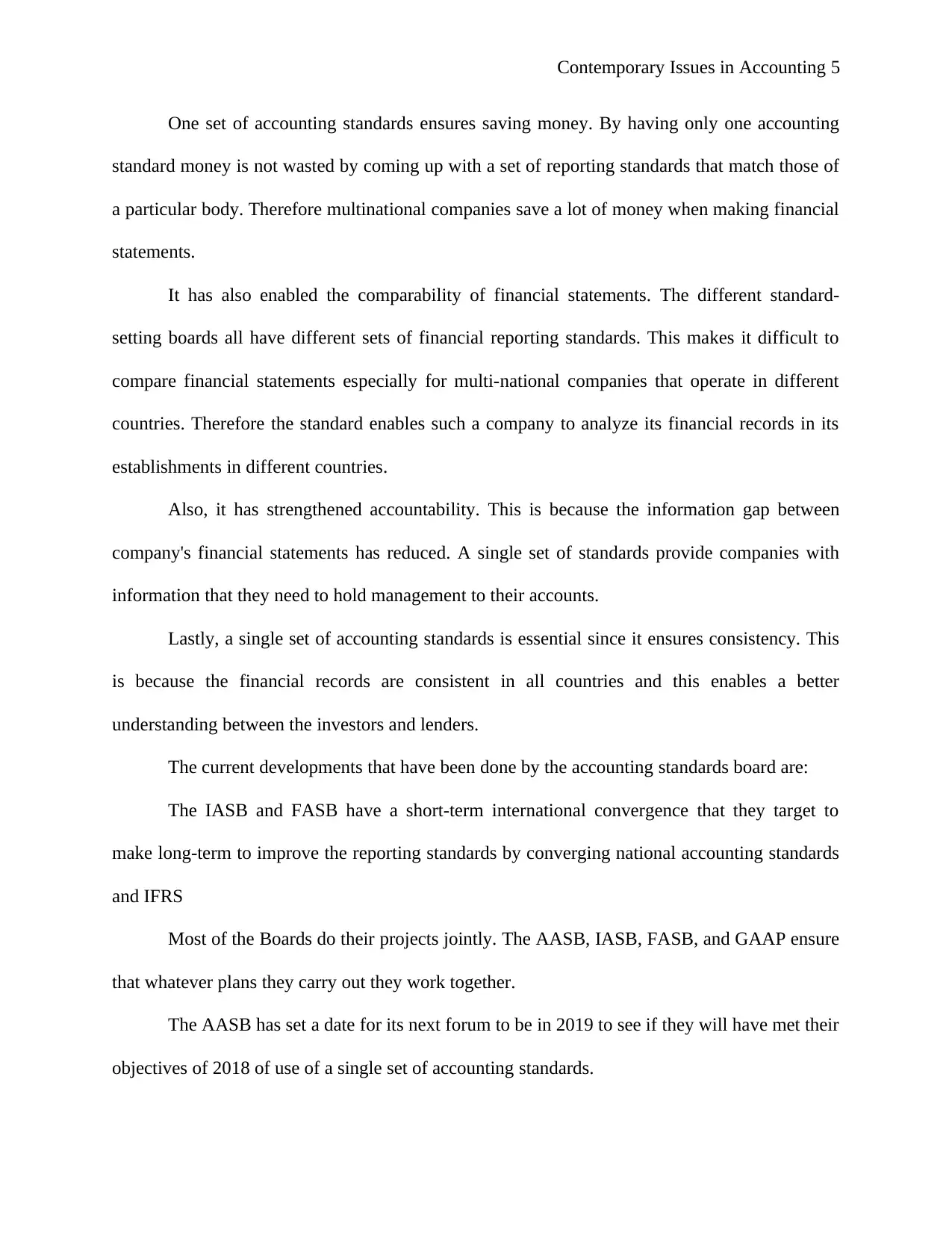
Contemporary Issues in Accounting 5
One set of accounting standards ensures saving money. By having only one accounting
standard money is not wasted by coming up with a set of reporting standards that match those of
a particular body. Therefore multinational companies save a lot of money when making financial
statements.
It has also enabled the comparability of financial statements. The different standard-
setting boards all have different sets of financial reporting standards. This makes it difficult to
compare financial statements especially for multi-national companies that operate in different
countries. Therefore the standard enables such a company to analyze its financial records in its
establishments in different countries.
Also, it has strengthened accountability. This is because the information gap between
company's financial statements has reduced. A single set of standards provide companies with
information that they need to hold management to their accounts.
Lastly, a single set of accounting standards is essential since it ensures consistency. This
is because the financial records are consistent in all countries and this enables a better
understanding between the investors and lenders.
The current developments that have been done by the accounting standards board are:
The IASB and FASB have a short-term international convergence that they target to
make long-term to improve the reporting standards by converging national accounting standards
and IFRS
Most of the Boards do their projects jointly. The AASB, IASB, FASB, and GAAP ensure
that whatever plans they carry out they work together.
The AASB has set a date for its next forum to be in 2019 to see if they will have met their
objectives of 2018 of use of a single set of accounting standards.
One set of accounting standards ensures saving money. By having only one accounting
standard money is not wasted by coming up with a set of reporting standards that match those of
a particular body. Therefore multinational companies save a lot of money when making financial
statements.
It has also enabled the comparability of financial statements. The different standard-
setting boards all have different sets of financial reporting standards. This makes it difficult to
compare financial statements especially for multi-national companies that operate in different
countries. Therefore the standard enables such a company to analyze its financial records in its
establishments in different countries.
Also, it has strengthened accountability. This is because the information gap between
company's financial statements has reduced. A single set of standards provide companies with
information that they need to hold management to their accounts.
Lastly, a single set of accounting standards is essential since it ensures consistency. This
is because the financial records are consistent in all countries and this enables a better
understanding between the investors and lenders.
The current developments that have been done by the accounting standards board are:
The IASB and FASB have a short-term international convergence that they target to
make long-term to improve the reporting standards by converging national accounting standards
and IFRS
Most of the Boards do their projects jointly. The AASB, IASB, FASB, and GAAP ensure
that whatever plans they carry out they work together.
The AASB has set a date for its next forum to be in 2019 to see if they will have met their
objectives of 2018 of use of a single set of accounting standards.
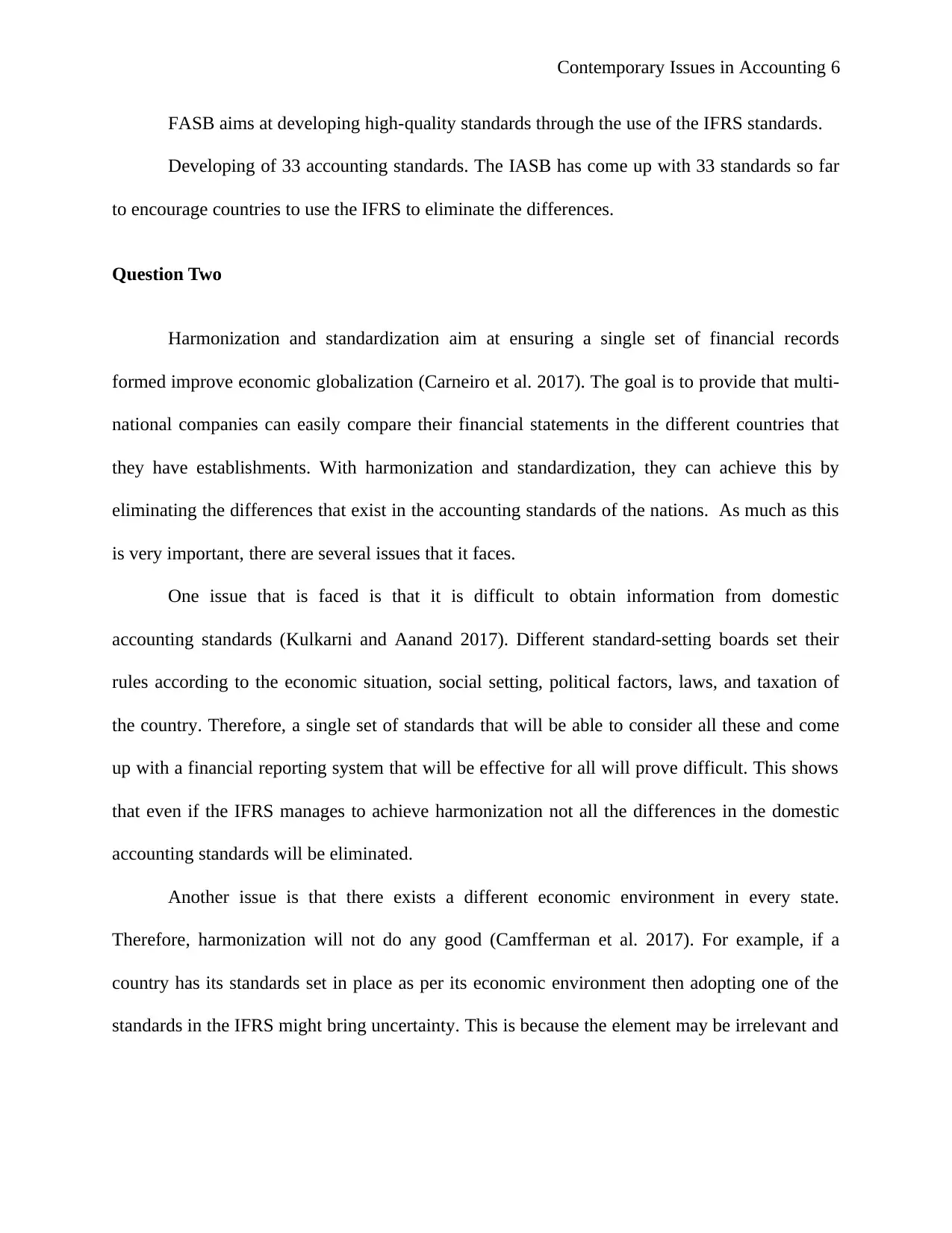
Contemporary Issues in Accounting 6
FASB aims at developing high-quality standards through the use of the IFRS standards.
Developing of 33 accounting standards. The IASB has come up with 33 standards so far
to encourage countries to use the IFRS to eliminate the differences.
Question Two
Harmonization and standardization aim at ensuring a single set of financial records
formed improve economic globalization (Carneiro et al. 2017). The goal is to provide that multi-
national companies can easily compare their financial statements in the different countries that
they have establishments. With harmonization and standardization, they can achieve this by
eliminating the differences that exist in the accounting standards of the nations. As much as this
is very important, there are several issues that it faces.
One issue that is faced is that it is difficult to obtain information from domestic
accounting standards (Kulkarni and Aanand 2017). Different standard-setting boards set their
rules according to the economic situation, social setting, political factors, laws, and taxation of
the country. Therefore, a single set of standards that will be able to consider all these and come
up with a financial reporting system that will be effective for all will prove difficult. This shows
that even if the IFRS manages to achieve harmonization not all the differences in the domestic
accounting standards will be eliminated.
Another issue is that there exists a different economic environment in every state.
Therefore, harmonization will not do any good (Camfferman et al. 2017). For example, if a
country has its standards set in place as per its economic environment then adopting one of the
standards in the IFRS might bring uncertainty. This is because the element may be irrelevant and
FASB aims at developing high-quality standards through the use of the IFRS standards.
Developing of 33 accounting standards. The IASB has come up with 33 standards so far
to encourage countries to use the IFRS to eliminate the differences.
Question Two
Harmonization and standardization aim at ensuring a single set of financial records
formed improve economic globalization (Carneiro et al. 2017). The goal is to provide that multi-
national companies can easily compare their financial statements in the different countries that
they have establishments. With harmonization and standardization, they can achieve this by
eliminating the differences that exist in the accounting standards of the nations. As much as this
is very important, there are several issues that it faces.
One issue that is faced is that it is difficult to obtain information from domestic
accounting standards (Kulkarni and Aanand 2017). Different standard-setting boards set their
rules according to the economic situation, social setting, political factors, laws, and taxation of
the country. Therefore, a single set of standards that will be able to consider all these and come
up with a financial reporting system that will be effective for all will prove difficult. This shows
that even if the IFRS manages to achieve harmonization not all the differences in the domestic
accounting standards will be eliminated.
Another issue is that there exists a different economic environment in every state.
Therefore, harmonization will not do any good (Camfferman et al. 2017). For example, if a
country has its standards set in place as per its economic environment then adopting one of the
standards in the IFRS might bring uncertainty. This is because the element may be irrelevant and
⊘ This is a preview!⊘
Do you want full access?
Subscribe today to unlock all pages.

Trusted by 1+ million students worldwide
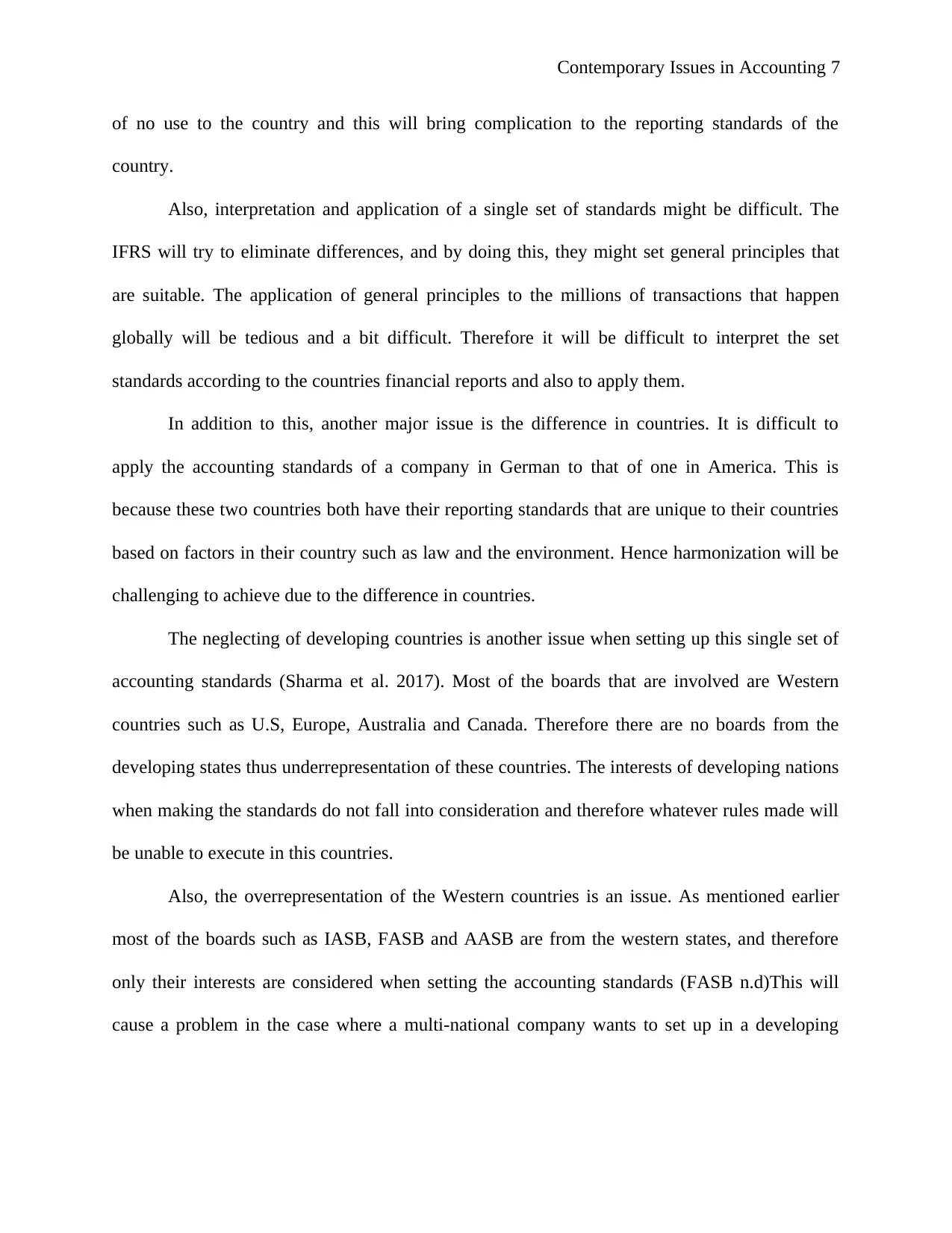
Contemporary Issues in Accounting 7
of no use to the country and this will bring complication to the reporting standards of the
country.
Also, interpretation and application of a single set of standards might be difficult. The
IFRS will try to eliminate differences, and by doing this, they might set general principles that
are suitable. The application of general principles to the millions of transactions that happen
globally will be tedious and a bit difficult. Therefore it will be difficult to interpret the set
standards according to the countries financial reports and also to apply them.
In addition to this, another major issue is the difference in countries. It is difficult to
apply the accounting standards of a company in German to that of one in America. This is
because these two countries both have their reporting standards that are unique to their countries
based on factors in their country such as law and the environment. Hence harmonization will be
challenging to achieve due to the difference in countries.
The neglecting of developing countries is another issue when setting up this single set of
accounting standards (Sharma et al. 2017). Most of the boards that are involved are Western
countries such as U.S, Europe, Australia and Canada. Therefore there are no boards from the
developing states thus underrepresentation of these countries. The interests of developing nations
when making the standards do not fall into consideration and therefore whatever rules made will
be unable to execute in this countries.
Also, the overrepresentation of the Western countries is an issue. As mentioned earlier
most of the boards such as IASB, FASB and AASB are from the western states, and therefore
only their interests are considered when setting the accounting standards (FASB n.d)This will
cause a problem in the case where a multi-national company wants to set up in a developing
of no use to the country and this will bring complication to the reporting standards of the
country.
Also, interpretation and application of a single set of standards might be difficult. The
IFRS will try to eliminate differences, and by doing this, they might set general principles that
are suitable. The application of general principles to the millions of transactions that happen
globally will be tedious and a bit difficult. Therefore it will be difficult to interpret the set
standards according to the countries financial reports and also to apply them.
In addition to this, another major issue is the difference in countries. It is difficult to
apply the accounting standards of a company in German to that of one in America. This is
because these two countries both have their reporting standards that are unique to their countries
based on factors in their country such as law and the environment. Hence harmonization will be
challenging to achieve due to the difference in countries.
The neglecting of developing countries is another issue when setting up this single set of
accounting standards (Sharma et al. 2017). Most of the boards that are involved are Western
countries such as U.S, Europe, Australia and Canada. Therefore there are no boards from the
developing states thus underrepresentation of these countries. The interests of developing nations
when making the standards do not fall into consideration and therefore whatever rules made will
be unable to execute in this countries.
Also, the overrepresentation of the Western countries is an issue. As mentioned earlier
most of the boards such as IASB, FASB and AASB are from the western states, and therefore
only their interests are considered when setting the accounting standards (FASB n.d)This will
cause a problem in the case where a multi-national company wants to set up in a developing
Paraphrase This Document
Need a fresh take? Get an instant paraphrase of this document with our AI Paraphraser
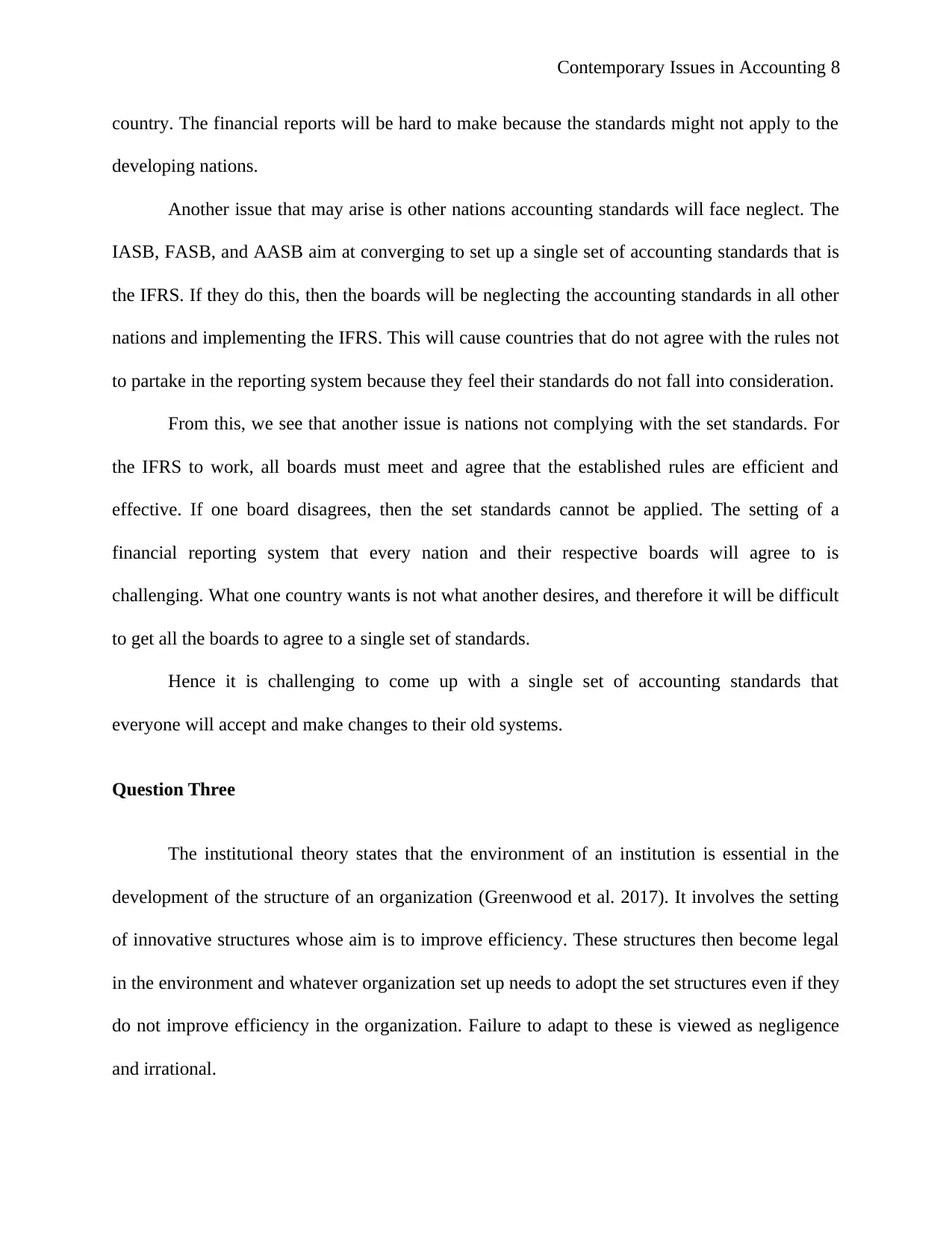
Contemporary Issues in Accounting 8
country. The financial reports will be hard to make because the standards might not apply to the
developing nations.
Another issue that may arise is other nations accounting standards will face neglect. The
IASB, FASB, and AASB aim at converging to set up a single set of accounting standards that is
the IFRS. If they do this, then the boards will be neglecting the accounting standards in all other
nations and implementing the IFRS. This will cause countries that do not agree with the rules not
to partake in the reporting system because they feel their standards do not fall into consideration.
From this, we see that another issue is nations not complying with the set standards. For
the IFRS to work, all boards must meet and agree that the established rules are efficient and
effective. If one board disagrees, then the set standards cannot be applied. The setting of a
financial reporting system that every nation and their respective boards will agree to is
challenging. What one country wants is not what another desires, and therefore it will be difficult
to get all the boards to agree to a single set of standards.
Hence it is challenging to come up with a single set of accounting standards that
everyone will accept and make changes to their old systems.
Question Three
The institutional theory states that the environment of an institution is essential in the
development of the structure of an organization (Greenwood et al. 2017). It involves the setting
of innovative structures whose aim is to improve efficiency. These structures then become legal
in the environment and whatever organization set up needs to adopt the set structures even if they
do not improve efficiency in the organization. Failure to adapt to these is viewed as negligence
and irrational.
country. The financial reports will be hard to make because the standards might not apply to the
developing nations.
Another issue that may arise is other nations accounting standards will face neglect. The
IASB, FASB, and AASB aim at converging to set up a single set of accounting standards that is
the IFRS. If they do this, then the boards will be neglecting the accounting standards in all other
nations and implementing the IFRS. This will cause countries that do not agree with the rules not
to partake in the reporting system because they feel their standards do not fall into consideration.
From this, we see that another issue is nations not complying with the set standards. For
the IFRS to work, all boards must meet and agree that the established rules are efficient and
effective. If one board disagrees, then the set standards cannot be applied. The setting of a
financial reporting system that every nation and their respective boards will agree to is
challenging. What one country wants is not what another desires, and therefore it will be difficult
to get all the boards to agree to a single set of standards.
Hence it is challenging to come up with a single set of accounting standards that
everyone will accept and make changes to their old systems.
Question Three
The institutional theory states that the environment of an institution is essential in the
development of the structure of an organization (Greenwood et al. 2017). It involves the setting
of innovative structures whose aim is to improve efficiency. These structures then become legal
in the environment and whatever organization set up needs to adopt the set structures even if they
do not improve efficiency in the organization. Failure to adapt to these is viewed as negligence
and irrational.
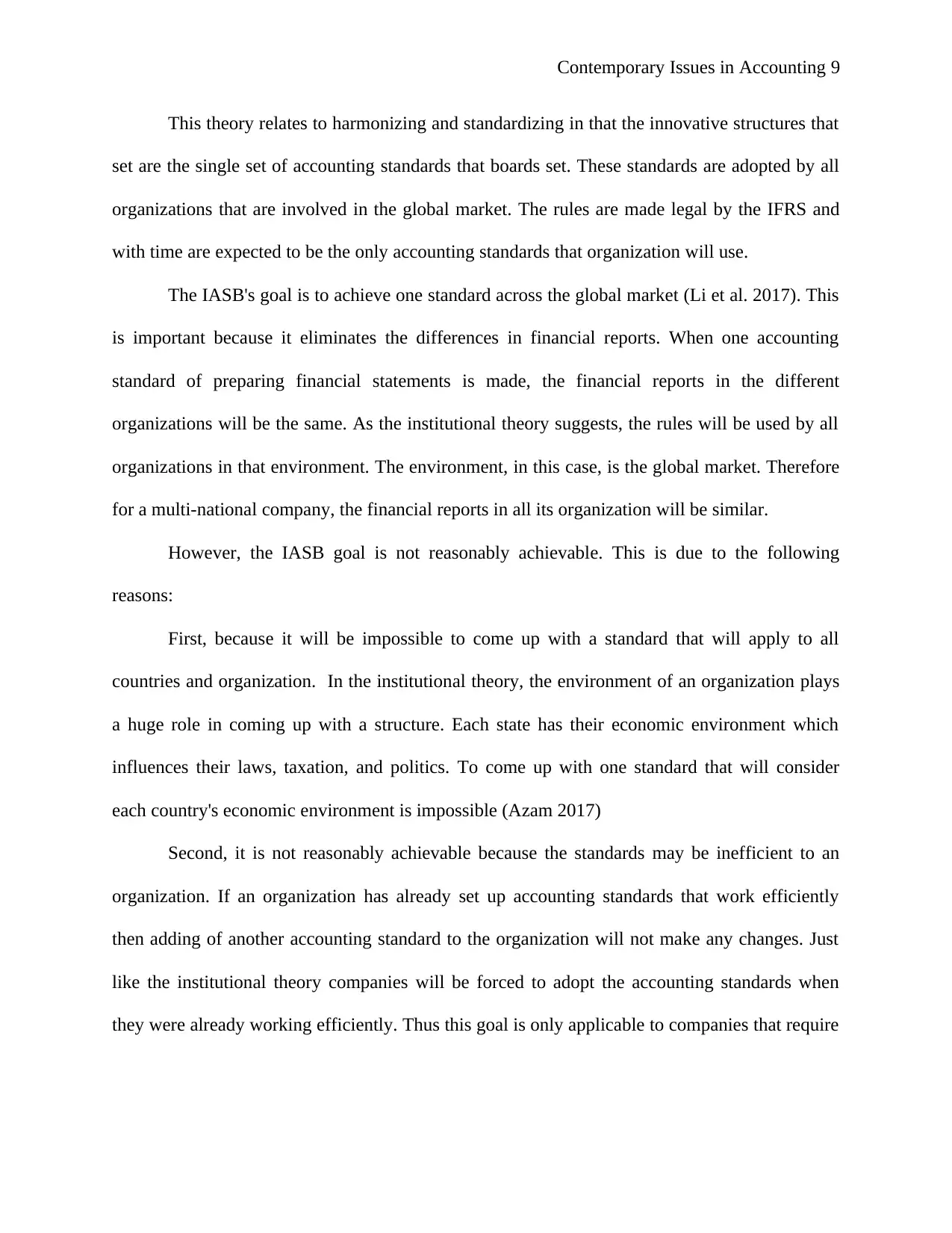
Contemporary Issues in Accounting 9
This theory relates to harmonizing and standardizing in that the innovative structures that
set are the single set of accounting standards that boards set. These standards are adopted by all
organizations that are involved in the global market. The rules are made legal by the IFRS and
with time are expected to be the only accounting standards that organization will use.
The IASB's goal is to achieve one standard across the global market (Li et al. 2017). This
is important because it eliminates the differences in financial reports. When one accounting
standard of preparing financial statements is made, the financial reports in the different
organizations will be the same. As the institutional theory suggests, the rules will be used by all
organizations in that environment. The environment, in this case, is the global market. Therefore
for a multi-national company, the financial reports in all its organization will be similar.
However, the IASB goal is not reasonably achievable. This is due to the following
reasons:
First, because it will be impossible to come up with a standard that will apply to all
countries and organization. In the institutional theory, the environment of an organization plays
a huge role in coming up with a structure. Each state has their economic environment which
influences their laws, taxation, and politics. To come up with one standard that will consider
each country's economic environment is impossible (Azam 2017)
Second, it is not reasonably achievable because the standards may be inefficient to an
organization. If an organization has already set up accounting standards that work efficiently
then adding of another accounting standard to the organization will not make any changes. Just
like the institutional theory companies will be forced to adopt the accounting standards when
they were already working efficiently. Thus this goal is only applicable to companies that require
This theory relates to harmonizing and standardizing in that the innovative structures that
set are the single set of accounting standards that boards set. These standards are adopted by all
organizations that are involved in the global market. The rules are made legal by the IFRS and
with time are expected to be the only accounting standards that organization will use.
The IASB's goal is to achieve one standard across the global market (Li et al. 2017). This
is important because it eliminates the differences in financial reports. When one accounting
standard of preparing financial statements is made, the financial reports in the different
organizations will be the same. As the institutional theory suggests, the rules will be used by all
organizations in that environment. The environment, in this case, is the global market. Therefore
for a multi-national company, the financial reports in all its organization will be similar.
However, the IASB goal is not reasonably achievable. This is due to the following
reasons:
First, because it will be impossible to come up with a standard that will apply to all
countries and organization. In the institutional theory, the environment of an organization plays
a huge role in coming up with a structure. Each state has their economic environment which
influences their laws, taxation, and politics. To come up with one standard that will consider
each country's economic environment is impossible (Azam 2017)
Second, it is not reasonably achievable because the standards may be inefficient to an
organization. If an organization has already set up accounting standards that work efficiently
then adding of another accounting standard to the organization will not make any changes. Just
like the institutional theory companies will be forced to adopt the accounting standards when
they were already working efficiently. Thus this goal is only applicable to companies that require
⊘ This is a preview!⊘
Do you want full access?
Subscribe today to unlock all pages.

Trusted by 1+ million students worldwide
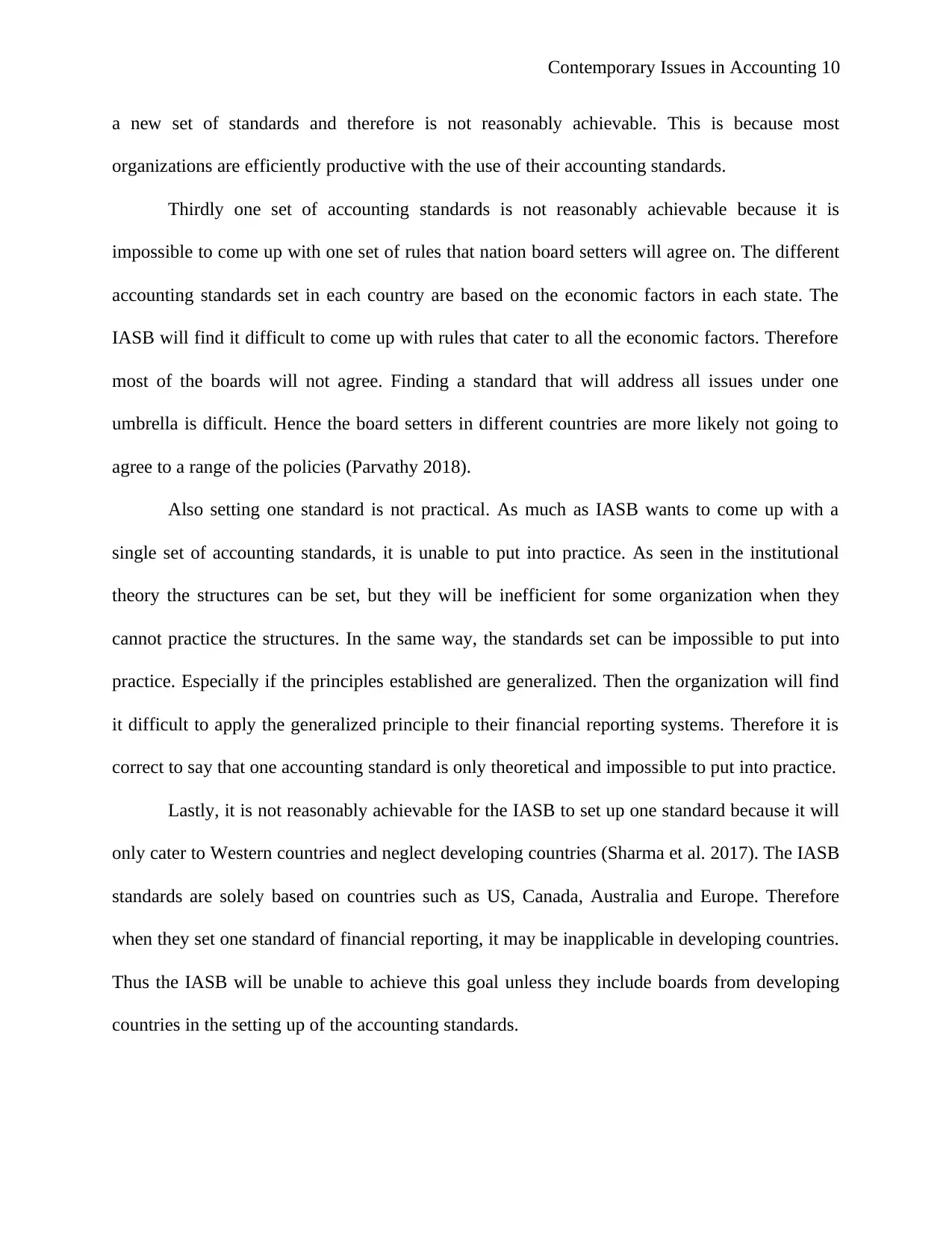
Contemporary Issues in Accounting 10
a new set of standards and therefore is not reasonably achievable. This is because most
organizations are efficiently productive with the use of their accounting standards.
Thirdly one set of accounting standards is not reasonably achievable because it is
impossible to come up with one set of rules that nation board setters will agree on. The different
accounting standards set in each country are based on the economic factors in each state. The
IASB will find it difficult to come up with rules that cater to all the economic factors. Therefore
most of the boards will not agree. Finding a standard that will address all issues under one
umbrella is difficult. Hence the board setters in different countries are more likely not going to
agree to a range of the policies (Parvathy 2018).
Also setting one standard is not practical. As much as IASB wants to come up with a
single set of accounting standards, it is unable to put into practice. As seen in the institutional
theory the structures can be set, but they will be inefficient for some organization when they
cannot practice the structures. In the same way, the standards set can be impossible to put into
practice. Especially if the principles established are generalized. Then the organization will find
it difficult to apply the generalized principle to their financial reporting systems. Therefore it is
correct to say that one accounting standard is only theoretical and impossible to put into practice.
Lastly, it is not reasonably achievable for the IASB to set up one standard because it will
only cater to Western countries and neglect developing countries (Sharma et al. 2017). The IASB
standards are solely based on countries such as US, Canada, Australia and Europe. Therefore
when they set one standard of financial reporting, it may be inapplicable in developing countries.
Thus the IASB will be unable to achieve this goal unless they include boards from developing
countries in the setting up of the accounting standards.
a new set of standards and therefore is not reasonably achievable. This is because most
organizations are efficiently productive with the use of their accounting standards.
Thirdly one set of accounting standards is not reasonably achievable because it is
impossible to come up with one set of rules that nation board setters will agree on. The different
accounting standards set in each country are based on the economic factors in each state. The
IASB will find it difficult to come up with rules that cater to all the economic factors. Therefore
most of the boards will not agree. Finding a standard that will address all issues under one
umbrella is difficult. Hence the board setters in different countries are more likely not going to
agree to a range of the policies (Parvathy 2018).
Also setting one standard is not practical. As much as IASB wants to come up with a
single set of accounting standards, it is unable to put into practice. As seen in the institutional
theory the structures can be set, but they will be inefficient for some organization when they
cannot practice the structures. In the same way, the standards set can be impossible to put into
practice. Especially if the principles established are generalized. Then the organization will find
it difficult to apply the generalized principle to their financial reporting systems. Therefore it is
correct to say that one accounting standard is only theoretical and impossible to put into practice.
Lastly, it is not reasonably achievable for the IASB to set up one standard because it will
only cater to Western countries and neglect developing countries (Sharma et al. 2017). The IASB
standards are solely based on countries such as US, Canada, Australia and Europe. Therefore
when they set one standard of financial reporting, it may be inapplicable in developing countries.
Thus the IASB will be unable to achieve this goal unless they include boards from developing
countries in the setting up of the accounting standards.
Paraphrase This Document
Need a fresh take? Get an instant paraphrase of this document with our AI Paraphraser
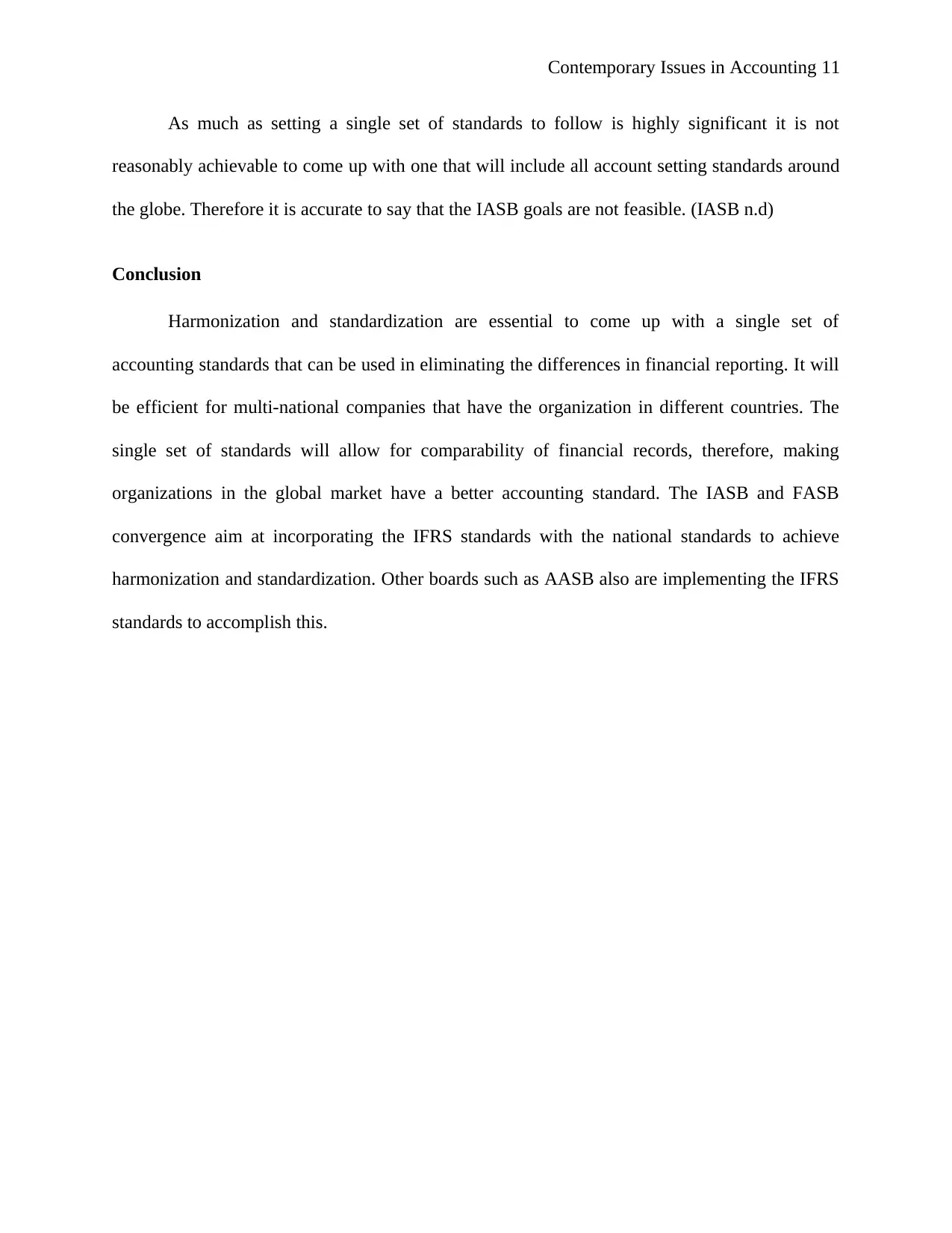
Contemporary Issues in Accounting 11
As much as setting a single set of standards to follow is highly significant it is not
reasonably achievable to come up with one that will include all account setting standards around
the globe. Therefore it is accurate to say that the IASB goals are not feasible. (IASB n.d)
Conclusion
Harmonization and standardization are essential to come up with a single set of
accounting standards that can be used in eliminating the differences in financial reporting. It will
be efficient for multi-national companies that have the organization in different countries. The
single set of standards will allow for comparability of financial records, therefore, making
organizations in the global market have a better accounting standard. The IASB and FASB
convergence aim at incorporating the IFRS standards with the national standards to achieve
harmonization and standardization. Other boards such as AASB also are implementing the IFRS
standards to accomplish this.
As much as setting a single set of standards to follow is highly significant it is not
reasonably achievable to come up with one that will include all account setting standards around
the globe. Therefore it is accurate to say that the IASB goals are not feasible. (IASB n.d)
Conclusion
Harmonization and standardization are essential to come up with a single set of
accounting standards that can be used in eliminating the differences in financial reporting. It will
be efficient for multi-national companies that have the organization in different countries. The
single set of standards will allow for comparability of financial records, therefore, making
organizations in the global market have a better accounting standard. The IASB and FASB
convergence aim at incorporating the IFRS standards with the national standards to achieve
harmonization and standardization. Other boards such as AASB also are implementing the IFRS
standards to accomplish this.
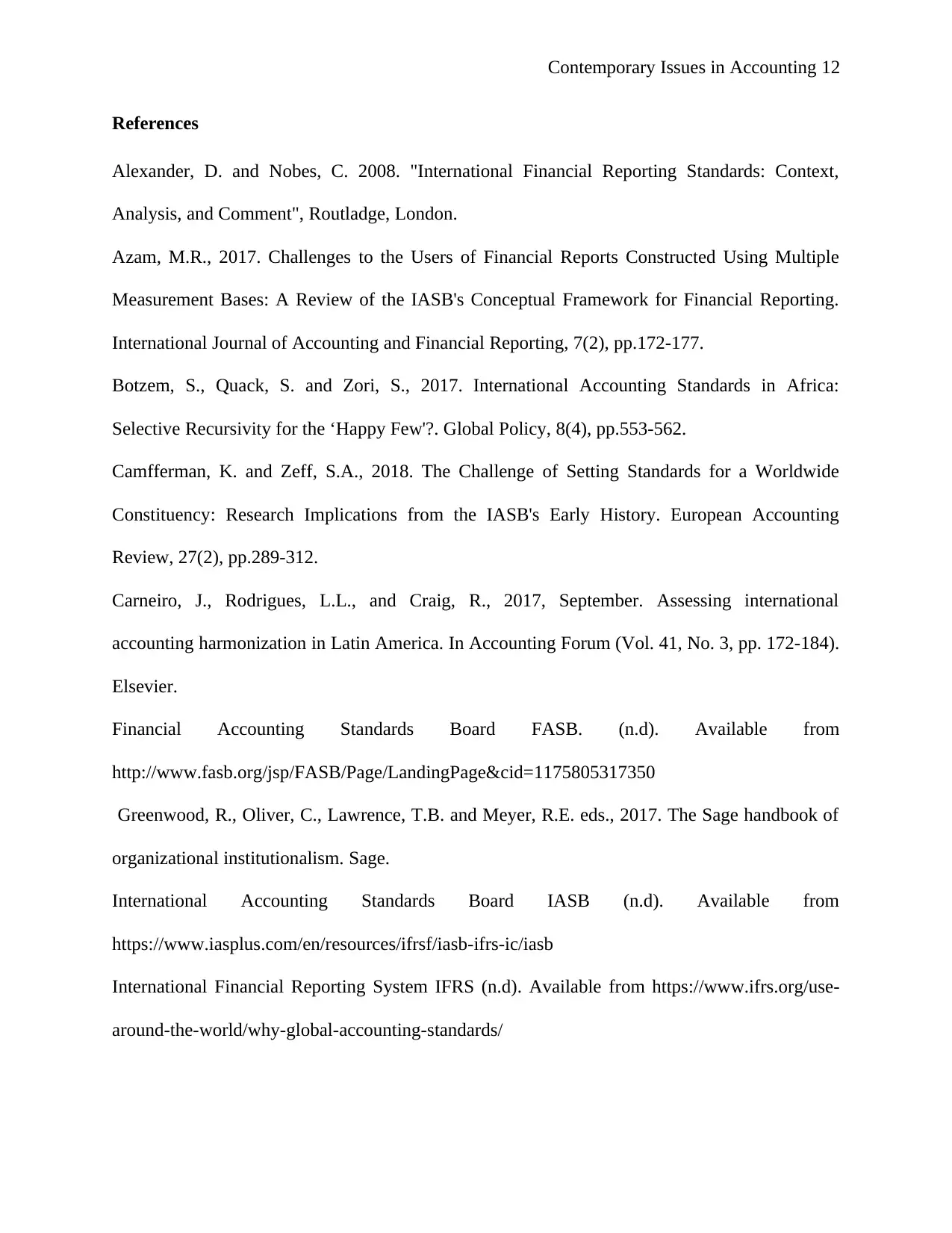
Contemporary Issues in Accounting 12
References
Alexander, D. and Nobes, C. 2008. "International Financial Reporting Standards: Context,
Analysis, and Comment", Routladge, London.
Azam, M.R., 2017. Challenges to the Users of Financial Reports Constructed Using Multiple
Measurement Bases: A Review of the IASB's Conceptual Framework for Financial Reporting.
International Journal of Accounting and Financial Reporting, 7(2), pp.172-177.
Botzem, S., Quack, S. and Zori, S., 2017. International Accounting Standards in Africa:
Selective Recursivity for the ‘Happy Few'?. Global Policy, 8(4), pp.553-562.
Camfferman, K. and Zeff, S.A., 2018. The Challenge of Setting Standards for a Worldwide
Constituency: Research Implications from the IASB's Early History. European Accounting
Review, 27(2), pp.289-312.
Carneiro, J., Rodrigues, L.L., and Craig, R., 2017, September. Assessing international
accounting harmonization in Latin America. In Accounting Forum (Vol. 41, No. 3, pp. 172-184).
Elsevier.
Financial Accounting Standards Board FASB. (n.d). Available from
http://www.fasb.org/jsp/FASB/Page/LandingPage&cid=1175805317350
Greenwood, R., Oliver, C., Lawrence, T.B. and Meyer, R.E. eds., 2017. The Sage handbook of
organizational institutionalism. Sage.
International Accounting Standards Board IASB (n.d). Available from
https://www.iasplus.com/en/resources/ifrsf/iasb-ifrs-ic/iasb
International Financial Reporting System IFRS (n.d). Available from https://www.ifrs.org/use-
around-the-world/why-global-accounting-standards/
References
Alexander, D. and Nobes, C. 2008. "International Financial Reporting Standards: Context,
Analysis, and Comment", Routladge, London.
Azam, M.R., 2017. Challenges to the Users of Financial Reports Constructed Using Multiple
Measurement Bases: A Review of the IASB's Conceptual Framework for Financial Reporting.
International Journal of Accounting and Financial Reporting, 7(2), pp.172-177.
Botzem, S., Quack, S. and Zori, S., 2017. International Accounting Standards in Africa:
Selective Recursivity for the ‘Happy Few'?. Global Policy, 8(4), pp.553-562.
Camfferman, K. and Zeff, S.A., 2018. The Challenge of Setting Standards for a Worldwide
Constituency: Research Implications from the IASB's Early History. European Accounting
Review, 27(2), pp.289-312.
Carneiro, J., Rodrigues, L.L., and Craig, R., 2017, September. Assessing international
accounting harmonization in Latin America. In Accounting Forum (Vol. 41, No. 3, pp. 172-184).
Elsevier.
Financial Accounting Standards Board FASB. (n.d). Available from
http://www.fasb.org/jsp/FASB/Page/LandingPage&cid=1175805317350
Greenwood, R., Oliver, C., Lawrence, T.B. and Meyer, R.E. eds., 2017. The Sage handbook of
organizational institutionalism. Sage.
International Accounting Standards Board IASB (n.d). Available from
https://www.iasplus.com/en/resources/ifrsf/iasb-ifrs-ic/iasb
International Financial Reporting System IFRS (n.d). Available from https://www.ifrs.org/use-
around-the-world/why-global-accounting-standards/
⊘ This is a preview!⊘
Do you want full access?
Subscribe today to unlock all pages.

Trusted by 1+ million students worldwide
1 out of 13
Related Documents
Your All-in-One AI-Powered Toolkit for Academic Success.
+13062052269
info@desklib.com
Available 24*7 on WhatsApp / Email
![[object Object]](/_next/static/media/star-bottom.7253800d.svg)
Unlock your academic potential
Copyright © 2020–2026 A2Z Services. All Rights Reserved. Developed and managed by ZUCOL.




